Self driving vehicles, also known as autonomous vehicles, are transforming the way we think about transportation. As technological advancements continue, these vehicles promise to bring numerous benefits to individuals, society, and the environment. In this article, we will explore the various benefits of self driving vehicles and their potential impact on our daily lives and future mobility.
Enhanced Road Safety: Reducing Human Error
One of the most significant benefits of self driving vehicles is their potential to enhance road safety by reducing human error. Research shows that human error accounts for more than 90% of road accidents, leading to injuries, deaths, and costly damages. Self-driving vehicles are equipped with advanced sensors, cameras, and artificial intelligence systems designed to detect obstacles, predict traffic patterns, and avoid collisions. These technologies allow autonomous vehicles to make quicker decisions, reducing the likelihood of accidents caused by distractions, fatigue, or impaired driving.
Autonomous vehicles also maintain consistent speeds, follow traffic rules, and avoid risky behaviors like tailgating or aggressive driving. As a result, they can significantly reduce accidents, making roads safer for drivers, passengers, and pedestrians. Furthermore, autonomous vehicles can communicate with one another and traffic infrastructure, further improving overall safety by optimizing traffic flow.
Increased Mobility for People with Disabilities and the Elderly
The benefits of self driving vehicles extend beyond safety, providing newfound mobility to individuals who are unable to drive. Self-driving vehicles offer independence to those unable to drive, including people with disabilities, seniors, and those with medical conditions. Autonomous cars provide accessible transportation without needing human assistance, improving mobility, quality of life, social inclusion, and access to work, education, and leisure activities for these individuals.
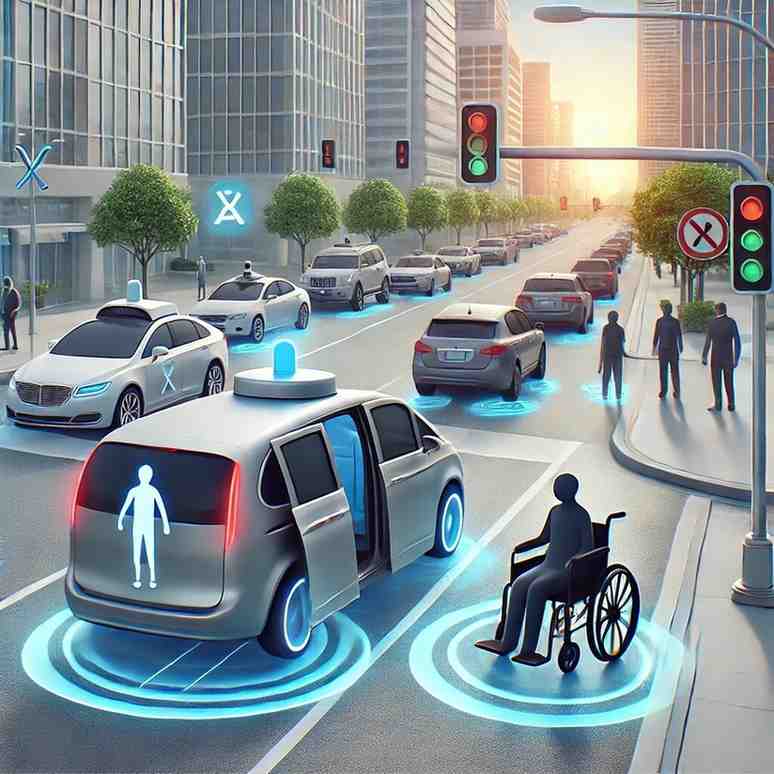
Here is the unique image illustrating Enhanced Road Safety and Increased Mobility for People with Disabilities and the Elderly through self-driving vehicles.
Reduction in Traffic Congestion of benefits of self driving vehicles
Another notable benefit of self driving vehicles is their potential to reduce traffic congestion in cities and urban areas. Traffic congestion is a significant issue, especially during peak hours, leading to lost time, increased fuel consumption, and elevated stress levels. Autonomous vehicles can alleviate this problem by improving traffic flow and minimizing the need for stop-and-go driving.
Self driving cars are capable of communicating with one another, allowing for more efficient lane changes, merges, and intersections. By optimizing routes and reducing unnecessary acceleration and braking, autonomous vehicles help reduce congestion and prevent traffic jams. Additionally, self driving vehicles can operate more closely together than human-driven cars, increasing road capacity and reducing delays.
Environmental Benefits: Lower Emissions and Improved Fuel Efficiency
The benefits of self driving vehicles also extend to the environment, particularly through reduced emissions and improved fuel efficiency. Autonomous vehicles are designed to operate more efficiently than traditional cars, leading to less fuel consumption and fewer greenhouse gas emissions. By maintaining consistent speeds and optimizing routes, self driving cars minimize fuel wastage and unnecessary idling, which helps lower their environmental impact.
Many self-driving vehicles are being developed with electric or hybrid powertrains, significantly reducing their carbon footprint. Electric autonomous cars emit zero tailpipe emissions, contributing to cleaner air and less pollution in urban areas. As adoption of self-driving vehicles increases, reliance on fossil fuels will decrease, helping to combat climate change and promote sustainability.
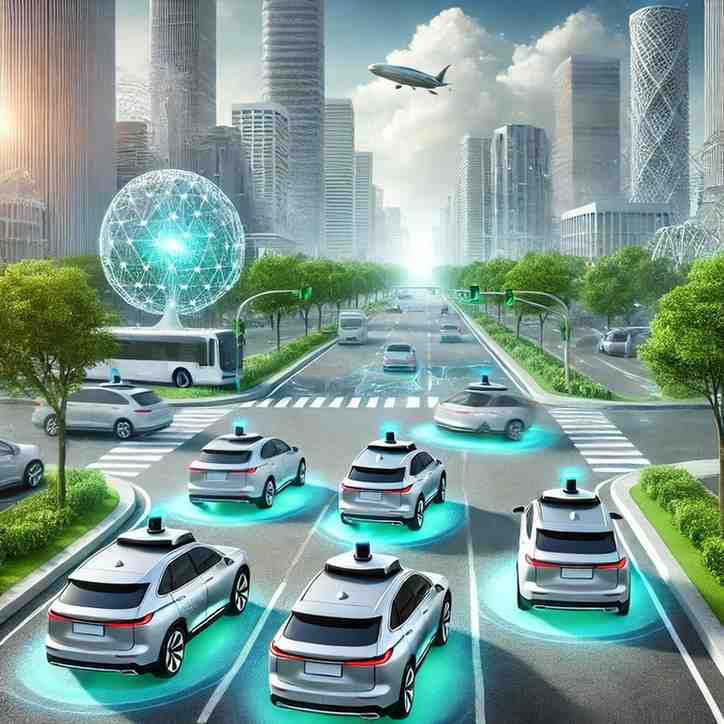
Here is the unique image illustrating the Reduction in Traffic Congestion and Environmental Benefits of self driving vehicles.
Economic Savings and Increased Productivity
The benefits of self driving vehicles include significant economic savings for both individuals and society. Autonomous vehicles have the potential to reduce transportation costs by eliminating the need for human drivers in sectors like ride-sharing, logistics, and delivery services. Companies can cut labor costs, improve efficiency, and provide faster services with self-driving vehicles. This can result in lower transportation costs for consumers as well.
Moreover, self driving cars free up time for passengers who would otherwise be focused on driving. Instead of being stuck behind the wheel, individuals can use their commute time to work, relax, or engage in other activities. This increased productivity can have positive economic implications, allowing people to make better use of their time and potentially boosting overall economic output.
Reduction in Parking Space Demand
Benefits of self driving vehicles can reduce the need for urban parking by dropping passengers off and parking themselves in remote areas. This frees up valuable city space for green areas, affordable housing, or commercial developments, making cities more livable and less congested. Autonomous vehicles can optimize land use, leading to more efficient and productive urban planning.
Improved Access to Transportation in Rural Areas
Benefits of self driving vehicles can enhance transportation in rural and underserved regions, where public transit is often limited. Autonomous cars could offer cost-effective, reliable ride-sharing or shuttle services, improving access to healthcare, education, and job opportunities. This would lead to more equitable transportation across different regions, benefiting individuals with mobility challenges.
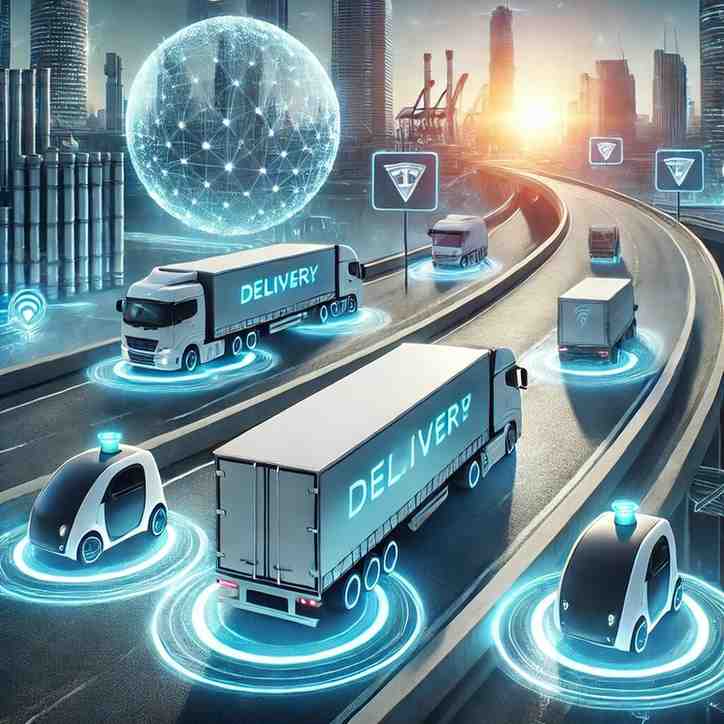
Here is the unique image representing the Enhanced Efficiency in Delivery and Logistics as well as Fewer Traffic Violations and Reduced Insurance Costs brought by self-driving vehicles.
Enhanced Efficiency in Delivery and Logistics
Another benefit of self driving vehicles is their potential to revolutionize the delivery and logistics industries. Autonomous trucks and delivery vehicles can operate continuously without the need for rest breaks, improving the efficiency of supply chains. With self driving technology, companies can reduce delivery times, minimize fuel costs, and meet the growing demand for fast, on-demand services.
Self-driving vehicles are also less prone to errors caused by fatigue or human limitations, reducing the likelihood of accidents or delays in deliveries. By enhancing the efficiency of logistics and transportation, autonomous vehicles can improve the reliability of supply chains and reduce the environmental impact of goods transportation.
Fewer Traffic Violations and Reduced Insurance Costs
Self-driving vehicles are programmed to follow traffic laws, reducing accidents and traffic infractions. Their adherence to safety regulations leads to fewer violations and accidents, which could result in lower insurance premiums for owners. Insurance companies may offer reduced rates due to the lower risk associated with autonomous cars, providing cost savings for consumers.
Challenges and Considerations
Despite the benefits of self driving vehicles face challenges, including high infrastructure costs, cybersecurity risks, and public skepticism. Governments must create policies to ensure their safe integration. Addressing concerns about hacking, safety, and public trust will be key to widespread adoption of self driving technology.
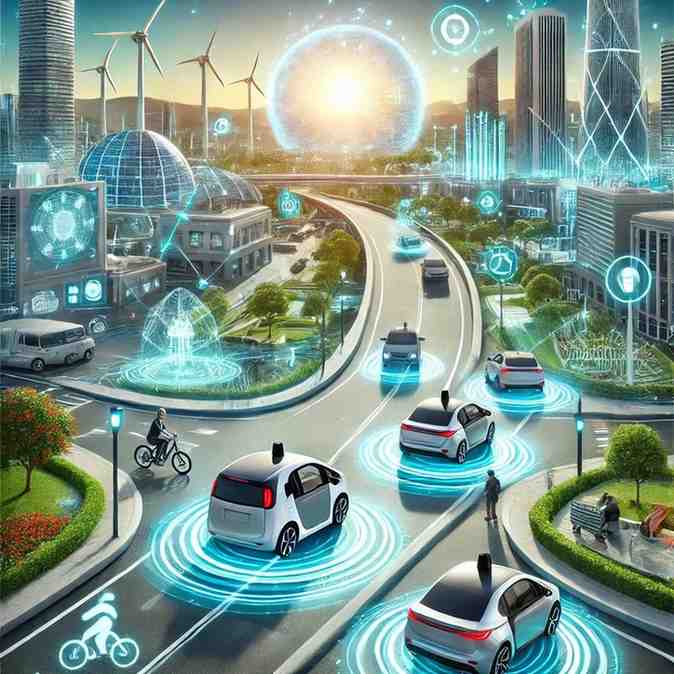
Here is the unique image illustrating The Future of Self-Driving Vehicles.
The Future of Self Driving Vehicles
As technology continues to advance, the benefits of self driving vehicles will likely become more evident. Autonomous vehicles have the potential to transform transportation systems, making them safer, more efficient, and more environmentally friendly. However, it will take time for self driving cars to become a common sight on the roads.
Governments, businesses, and consumers must work together to overcome the challenges associated with self-driving vehicles and ensure their successful integration into society. With continued innovation and collaboration, self driving cars have the potential to revolutionize the future of transportation and bring about a new era of mobility.
FAQ: Benefits of Self Driving Vehicles
Q: What are the main benefits of self driving vehicles?
Self driving vehicles offer enhanced road safety, reduced traffic congestion, improved accessibility, environmental sustainability, and increased fuel efficiency.
Q: How do self-driving vehicles improve road safety?
Autonomous vehicles reduce human errors by using advanced sensors and AI to detect obstacles, follow traffic rules, and avoid collisions.
Q: Can self driving vehicles reduce traffic congestion?
Yes, autonomous vehicles communicate with each other and optimize traffic flow, reducing congestion by minimizing unnecessary stops and starts.
Q: How do self-driving vehicles benefit people with disabilities and the elderly?
Self driving cars provide mobility and independence for individuals who cannot drive, improving their access to transportation and daily activities.
Q: Do self-driving vehicles have environmental benefits?
Yes, autonomous vehicles reduce emissions by optimizing fuel use and incorporating electric or hybrid powertrains, promoting environmental sustainability.
Q: Can self driving vehicles lead to economic savings?
Self-driving vehicles reduce labor costs in industries like logistics and ride-sharing, while also increasing productivity by freeing passengers’ time.
Q: Will self-driving vehicles reduce the demand for parking spaces?
Yes, autonomous cars can drop passengers off and park themselves in remote areas, reducing the need for urban parking spaces.
Q: Can self-driving vehicles improve transportation access in rural areas?
Autonomous vehicles can provide reliable transportation services in underserved areas, improving access to essential services in rural communities.
Q: How do self-driving vehicles enhance efficiency in the logistics and delivery industries?
Autonomous delivery trucks operate continuously without rest, reducing delivery times, minimizing fuel costs, and improving supply chain efficiency.
Q: Will self-driving vehicles lead to fewer traffic violations?
Yes, autonomous vehicles are programmed to follow traffic laws, leading to fewer violations, accidents, and potentially lower insurance premiums.
Q: Are there any challenges associated with self-driving vehicles?
Yes, challenges include high development costs, cybersecurity risks, public perception, and the need for infrastructure and regulatory adjustments.
Q: What is the future of self-driving vehicles?
The future of self-driving vehicles is promising, with advancements in technology potentially transforming transportation into a safer, efficient, and sustainable system.
Conclusion of the benefits of self driving vehicles
The benefits of self driving vehicles are extensive, offering improvements in safety, efficiency, mobility, and sustainability. They reduce road accidents, enhance transportation access for people with disabilities, and lead to economic and environmental gains.
However, challenges like high costs, cybersecurity, and public acceptance remain. As technology evolves, addressing these hurdles while maximizing the advantages is crucial.
In the future, self-driving cars may become a key part of transportation, reshaping travel and our interactions with the environment. With thoughtful innovation, autonomous vehicles can create safer, more accessible, and efficient transportation for all.

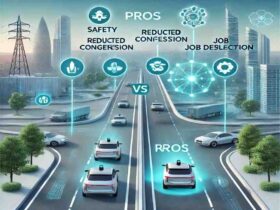
Leave a Review